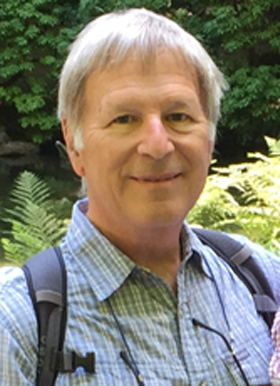
Address:
- Hematology Division
Mail Stop 8125-0022-01, Washington University, 660 South Euclid Avenue, St. Louis, MO 63110 (mail)
Clinical Interest: Benign hematology
Research Interest: Regulation of blood coagulation
Research: Thrombin is the major protease generated during blood coagulation at sites of vascular injury. It converts fibrinogen to fibrin monomers, which polymerize to form a clot, and cleaves G-protein-coupled receptors on platelets and endothelial cells, causing platelet aggregation, secretion of chemokines, and recruitment of inflammatory cells. Thrombin appears to induce smooth muscle cell proliferation in developing atherosclerotic plaques. Therefore, thrombin participates not only in normal blood clotting, but also in pathologic processes such as thrombosis and atherogenesis.
We are interested in proteins that regulate the activity of thrombin. One of these is heparin cofactor II (HCII), a plasma protein that inhibits thrombin by formation of a covalent 1:1 complex. Dermatan sulfate and heparan sulfate bind to HCII and increase the rate of thrombin inhibition >1000-fold. Biosynthesis of these glycosaminoglycans by cells in the vessel wall may determine the site of action of HCII in vivo. We discovered that specific oligosaccharide sequences in dermatan sulfate chains are required to stimulate HCII, and we determined the structures of these oligosaccharides by enzymatic degradation and mass spectrometry. We investigated the protease- and oligosaccharide-binding regions of HCII by site-directed mutagenesis of the cDNA. We generated HCII-deficient mice by homologous recombination in embryonic stem cells and found that these mice develop thrombi more rapidly than do wild-type animals after injury of the carotid arterial endothelium. Using these mice, we investigated HCII in a variety of other models in which thrombin may play a role.

Frozen sections of carotid arteries harvested from HCII+/+ mice before (A) or 30 minutes after (B) laser-induced injury were stained with a polyclonal goat anti-HCII IgG.
No HCII antigen was detected in the injured carotid artery of a control (HCII−/−) mouse (C).
Arrow indicates internal elastic lamina; arrowhead, external elastic lamina.
From: He L, Giri TK, Vicente CP, Tollefsen DM
Vascular dermatan sulfate regulates the antithrombotic activity of heparin cofactor II.
Blood 2008 Apr 15;111(8):4118-25
Biosketch
Education
- 1977-1971: MD/PhD (Biochemistry), Washington University School of Medicine, St. Louis, MO
- 1971-1970: Stanford University School of Medicine, Palo Alto, CA
- 1970-1966: BA in Chemistry, Grinnell College, Grinnell, IA
Post-Graduate Training
- 1979: Fellow, Department of Internal Medicine (Hematology-Oncology), Washington University School of Medicine, St. Louis, MO
- 1979-1977: Resident, Department of Internal Medicine, University of Colorado School of Medicine, Denver, CO
Academic Positions
- 1993-present: Professor, Department of Internal Medicine, Washington University, St. Louis, MO
- 2015-2005: Professor, Department of Pathology & Immunology, Washington University, St. Louis, MO
- 2010-1983: Assistant Professor, Department of Biochemistry & Molecular Biophysics, Washington University, St. Louis, MO
- 1993-1985: Associate Professor, Department of Internal Medicine, Washington University, St. Louis, MO
- 1985-1980: Assistant Professor, Department of Internal Medicine, Washington University, St. Louis, MO
- 1980-1979: Instructor, Department of Internal Medicine, Washington University, St. Louis, MO
University & Hospital Appointments & Committees
- 2007-present: Friends of Music Advisory Council, Washington University
- 2021-2011: Board of Directors, Whittemore House, Washington University
- 2017-2008: Anticoagulation Subcommittee, Barnes-Jewish Hospital Pharmacy and Therapeutics Committee
- 2010-2009: Chairman, Planning Committee, Washington University Medical Scientist Training Program 40th Anniversary Celebration
- 2008-1983: Medical Scientist Training Program Committee, Washington University School of Medicine
- 1998-1996: Advisory Committee on Tenure and Academic Freedom, Washington University
- 1998-1996: Faculty Senate Council, Washington University
- 1991-1988: Secretary, Executive Committee of the Faculty Council, Washington University School of Medicine
Honors & Awards
- 2018: Faculty Achievement Award, Washington University Medical Center Alumni Association
- 1988: Elected to Association of American Physicians
- 1987-1982: NIH Research Career Development Award
- 1984: Elected to American Society for Clinical Investigation
- 1977: Alpha Omega Alpha
- 1977-1972: Medical Scientist Training Program, Washington University
- 1970: Phi Beta Kappa
Editorial Responsibilities
- 2018-2006: Peer Reviewer, UpToDate
- 2009-2008: Advisory Board, Journal of Thrombosis and Haemostasis
- 1997-1993: Editorial Board, Blood
- 1996-1992: Editorial Board, Journal of Biological Chemistry
National Scientific Panels
- 2012: Co-organizer, Highlights of ASH in North America, “Thrombosis and Anticoagulation”
- 2011: Organizer, American Society of Hematology Education Session “Consultative Hematology I: Common Questions in Thrombosis Consults”
- 2009: NIH Special Emphasis Panel
- 2008: American Heart Association, Lipoproteins, Lipid Metabolism and Nutrition & Thrombosis Peer Review Committee
- 2002: American Heart Association, National Study Committee on Thrombosis
- 2001: Board of Scientific Counselors Review Panel, NIH Clinical Center
- 2000-1998: American Heart Association, National Study Committee on Thrombosis
- 1996: Program Committee, International Symposium on the Chemistry and Biology of Serpins, Chapel Hill, NC
- 1997-1993: American Society of Hematology, Scientific Subcommittee on Thrombosis
- 1991-1987: NIH Hematology Study Section
- 1985: NIH Hematology Study Section
- 1984: Secretary-Treasurer, National Blood Club
- 1988-1983: Research Peer Review Committee, American Heart Association, Missouri Affiliate
Professional Societies
- American Society of Hematology
- American Society for Clinical Investigation
- Association of American Physicians
Selected Publications
- Vascular Dermatan Sulfate Regulates the Antithrombotic Activity of Heparin Cofactor II
He L, Giri TK, Vicente CP, Tollefsen DM
Blood 2008 Apr 15;111(8):4118-25 - Accelerated Atherogenesis and Neointima Formation in Heparin Cofactor II-Deficient Mice
Vicente CP, He L, Tollefsen DM
Blood 2007 Dec 15;110(13):4261-7 - Heparin Cofactor II Inhibits Arterial Thrombosis After Endothelial Injury
He L, Vicente CP, Westrick RJ, Eitzman DT, Tollefsen DM
J Clin Invest 2002 Jan;109(2):213-9 - The N-Terminal Acidic Domain of Heparin Cofactor II Mediates the Inhibition of Alpha-Thrombin in the Presence of Glycosaminoglycans
Van Deerlin VMD, Tollefsen DM
J Biol Chem 1991 Oct 25;266(30):20223-31 - Structure of a Dermatan Sulfate Hexasaccharide that Binds to Heparin Cofactor II with High Affinity Maimone MM, Tollefsen DM
J Biol Chem 1990 Oct 25;265(30):18263-71